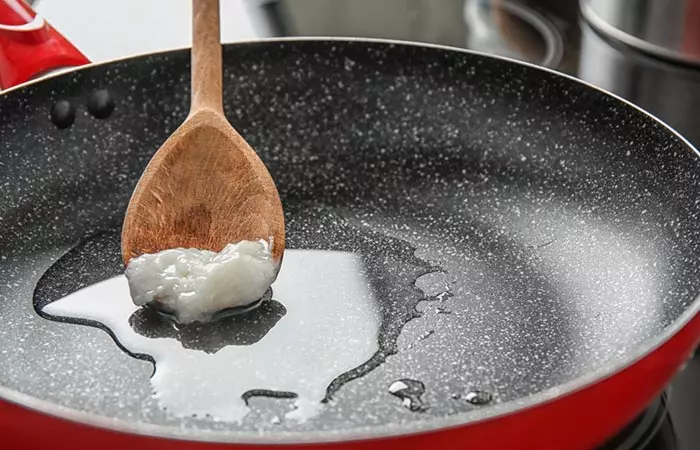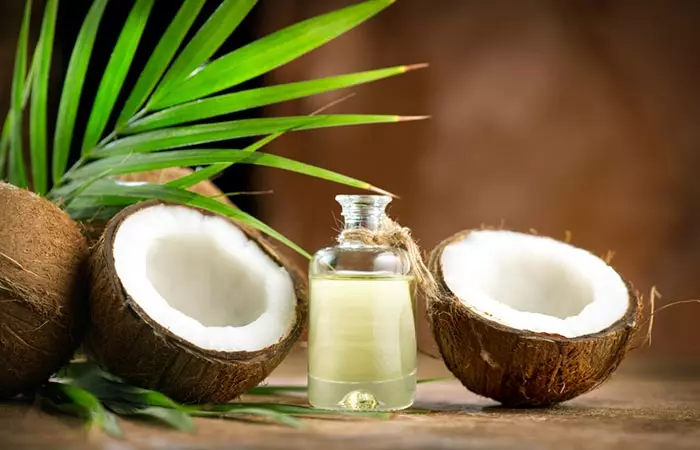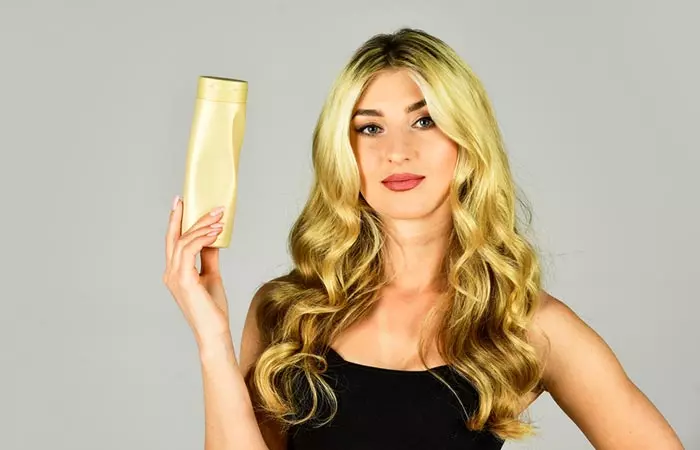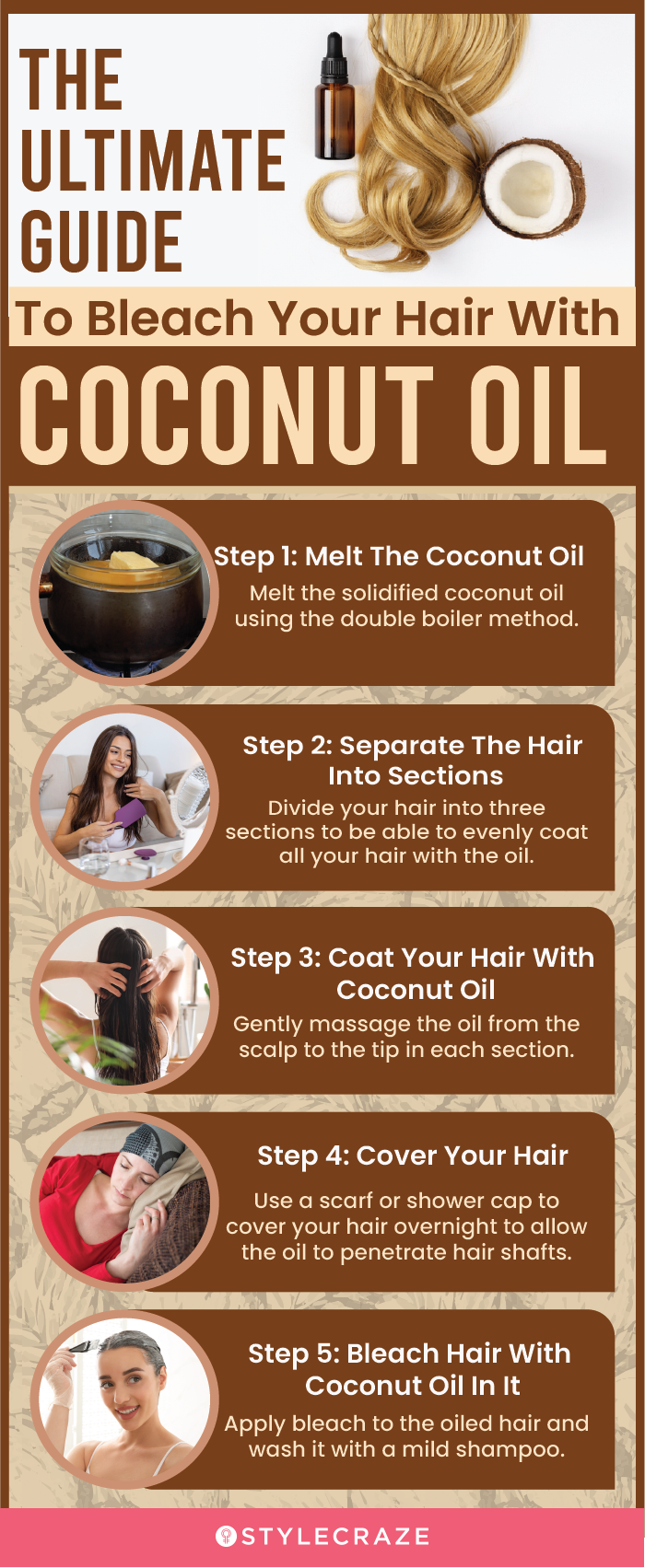Our hair is made with a protein known as keratin, and bleaches can strip off the natural hair oil (sebum) and protein from hair. They may also make your hair rough, dry, and brittle. But this hair oil works great on your hair and prevents all the damage caused by the bleaching process. This article explores a step-by-step guide to using coconut oil for bleached hair and its benefits. Keep reading.
Using Coconut Oil For Bleached Hair: A Step by Step Guide
Here is how you can do a coconut oil treatment before hair bleaching at home.
Step 1: Melt The Coconut Oil
If the coconut oil has solidified, scoop out a small quantity, and use the double boiler method to melt it. If you have short hair, you may rub the solidified oil between your palms and then apply it to your hair.
Step 2: Separate The Hair Into Sections
Part your hair into three sections before applying coconut oil. This will ensure all the hair strands are evenly coated with the oil.
Step 3: Coat Your Hair With Coconut Oil
Gently massage the coconut oil from the roots to the tip, one section at a time. Do not rub vigorously. Work along the length of your hair.
Step 4: Cover Your Hair
Cover your hair with a shower cap or a scarf and leave it overnight . This will allow the coconut oil to penetrate the hair shafts.
Step 5: Bleach Hair With Coconut Oil In It
Apply bleach to the oil-coated hair. The oil creates a barrier between the bleaching agent and the hair, minimizing the damaging effects of the hair bleach. Leave the bleach on for the prescribed time and then wash your hair with a mild shampoo. If you are wondering what type of coconut oil you should use on your hair, keep reading.
What Type of Coconut Oil is Right for your Hair?
It is always better to use unrefined or virgin coconut oil compared to processed coconut oil. This is because virgin coconut oil is extracted with the cold-process method that keeps all the nutrients intact. Further processing may cause nutrient loss. Coconut oil is a triglyceride of lauric acid and has a low molecular weight. As a result, it easily penetrates the hair shafts and protects the hair protein (1). Virgin coconut oil is considered to retain all the goodness of the oil. Here is how coconut oil may help protect your hair from harsh bleaching agents.
Benefits of Using Coconut Oil Before Hair Bleaching
Coconut oil is popular in natural hair care routines due to the major role it plays in hair health. You can incorporate it into your hair treatment regimen, follow hair care tips, and use high-quality hair care products to improve the appearance of your hair. Achieve hair damage prevention while enhancing your hair color with coconut oil. Here are some of its major benefits:
Using coconut oil as a pre-wash hair mask reduces protein loss and minimizes further damage caused by bleaching.
Coconut oil helps the hair retain moisture (2). This, in turn, keeps the hair soft and nourished. Using coconut oil on bleached hair can help reduce dryness and keep the hair moisturized, making it a great choice to hydrate your hair after bleaching. However, there are more steps to hydrate your hair after bleaching that you should know about to further enrich your hair.
Since coconut oil penetrates the hair shafts and keeps them moisturized, it also prevents split ends.
Maborosi, a blogger documenting her hair and product experimentation, shares her experience with bleaching with coconut oil. Reflecting on the process, she says, “I think the biggest player in this whole game was the coconut oil soak prior to bleaching. It is important that the coconut oil is able to penetrate the hair, so I was sure to do a good clarifying wash to remove any build-up that might prevent it from doing so (i).” While coconut oil offers numerous benefits, it has some potential downsides too. Scroll down to learn about them.
Side Effects Of Coconut Oil For Hair
Excess use of coconut oil can make your hair look and feel greasy and heavy. Coconut oil can be difficult to entirely rinse off and may result in residue buildup. Some people may be allergic to coconut oil and its proteins, and may experience itching, redness, or hives upon application. It can clog hair follicles and may cause or worsen existing dandruff or other scalp issues. It may weigh down fine or thin hair and leave it looking stiff or waxy.
Does coconut oil prevent bleach from working? A thin layer of coconut oil may not prevent the bleach from working but may ensure minimal damage. Should I put coconut oil in my hair before I dye it? Yes. You may apply a thin layer of coconut oil to your hair before you dye or bleach it to prevent chemical damage. Will coconut oil make my bleached hair brassy? No. On the contrary, coconut oil can protect your hair’s color and maintain its health and shine. Can I use coconut oil immediately after bleaching? Yes. You can use coconut oil as a mask or conditioner after bleaching, and it will not affect the color. Does coconut oil darken blonde hair? No. Coconut oil does not change the color of hair in any way. Using coconut oil before bleaching your hair sounds weird but interesting. Watch the video below to see whether it actually helps with the bleaching process in a step-by-step guide.









